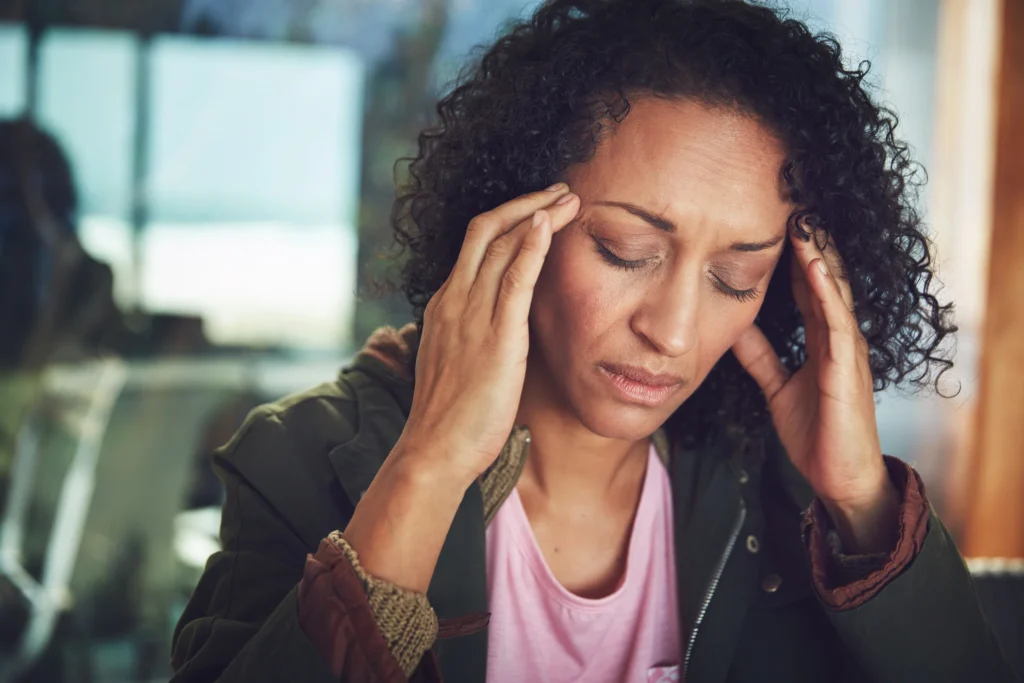Premenopause and perimenopause and menopause, oh my! Nobody likes to think about aging, and the confusing information around menopause makes it even more difficult to decipher.
To help you out, we’ll break down the difference between premenopause, perimenopause, and menopause in this guide. We’ll also explain what symptoms to look for and how to tell if you need menopause relief or another treatment option.
Premenopause vs. Perimenopause vs. Menopause

The first thing to know is that while you might hear your friends use the term “premenopausal,” it’s probably not a word that your doctor will use. Instead, medical professionals prefer to use the term “perimenopausal” to refer to the changes that precede the official onset of menopause. If they do use the term “premenopause,” it usually means that you are not exhibiting any symptoms of either perimenopause or menopause.
Most women enter perimenopause during their mid-to-late 40s, and it lasts two to eight years, with an average of four years. During perimenopause, your ovaries start to produce less hormones, causing changes in your menstrual cycle.
However, you will still get your period during the perimenopausal stage, but it will just be more irregular. (This means that you can still get pregnant, even if the chances are less likely, so make sure to keep using protection.)
You are officially considered menopausal when one full year has passed since your last period. However, the difference between perimenopause and menopause is a slow progression, and there aren’t really set milestones along the way because every person is different. In fact, in the beginning, it can be really hard to tell if you are entering perimenopause for sure or if your period just became irregular due to stress and other factors.
Perimenopause Symptoms

At this point, you are probably wondering how to tell if you have entered into perimenopause or not yet. Figuring this out can be a bit tricky, especially if your period is already not on a regular schedule.
Late periods and missed periods are a classic symptom of perimenopause, as are periods that are heavier or lighter — or shorter or longer — than usual. Like we said earlier, you can still get pregnant during perimenopause, so if your period is late or you miss a cycle, it’s a good idea to take a pregnancy test just to be sure.
If your cycle is already irregular, and you don’t notice any discernible changes in the overall pattern, then there are symptoms you can look for that might indicate you have entered perimenopause. Hot flashes and night sweats are a common sign, as are sleep problems such as falling and staying asleep (which are often exacerbated by the night sweats).
Mood swings, including depression and anxiety, are another symptom of perimenopause. However, if you already get mood swings around your monthly cycle, sometimes it can be hard to tell the difference. Of course, these mood swings can also be caused by other factors outside of perimenopause as well.
You might also experience increased vaginal dryness, which can lead to pain during sex or while using a tampon. This occurs because your falling hormone levels cause the pelvic tissues to become drier and thinner, which makes them less elastic and more sensitive.
Menopause Symptoms

Once your ovaries stop releasing eggs and you officially enter menopause, you may continue to experience some of the same symptoms. For example, it’s common to have hot flashes and night sweats during both perimenopause and menopause. (And even if you didn’t have hot flashes earlier, you still might develop them during menopause.)
Difficulty sleeping might also continue or get worse, especially if you have night sweats. The same goes for both mood swings and vaginal dryness. The vaginal dryness, coupled with a reduced libido, commonly lead to a lower sex drive.
The weakening of the pelvic tissues can also contribute to incontinence, which can take several forms and may require bladder leakage pads, pelvic exercises, and other strategies to manage it. You might experience the overwhelming urge to urinate, even when you don’t need to go (urge incontinence), or experience bladder leakage when coughing, sneezing, laughing, running, or jumping (stress incontinence). You might also start getting urinary tract infections (UTIs) more often as well.
Most women also notice physical changes as they age. Hormone-related weight gain tends to collect around the stomach and thighs, leading to the so-called “middle-age spread.” Aging women are also vulnerable to decreased muscle and bone mass, which exercise can help stave off. Some women also experience painful, stiff joints, which is caused by increased inflammation due to increased estrogen.
Mood changes may increase in severity or change in type as you get further into menopause. Some women also find themselves struggling with headaches, either of the garden variety or full-on migraines. Problems with thinking and memory, especially issues with short-term recall and brain fog, are another potential symptom of menopause.
Navigating Perimenopase and Menopause

It’s important to see your healthcare provider if you start experiencing symptoms that appear to be perimenopause or menopause. This is because the symptoms of certain underlying conditions, such as hyperthyroidism, can appear very similar to menopause.
Your doctor can help you rule out these potential underlying conditions and confirm that you are actually entering perimenopause or menopause. If you are still officially premenopause, they will help you figure out what course of treatment to take to address these underlying conditions.
If it does turn out that you are progressing towards menopause, that doesn’t mean that there is nothing you can do. There are many different options for menopause relief, from vaginal lubricants to hormone replacement therapy. Your doctor will work with you to manage your perimenopause and menopause symptoms as your body slowly stops ovulating over time.
Menopause may be a natural part of aging, but that doesn’t mean that no relief is available for your symptoms if they are bothering you or making a negative impact on your daily life.



